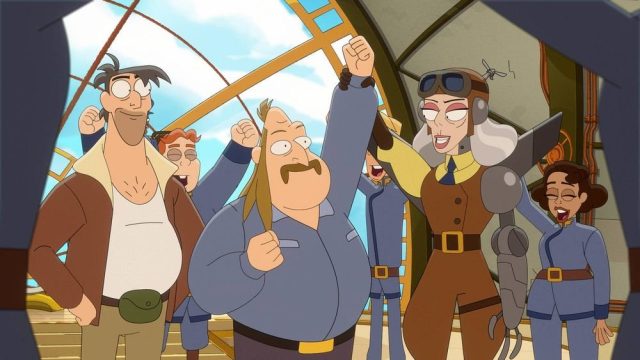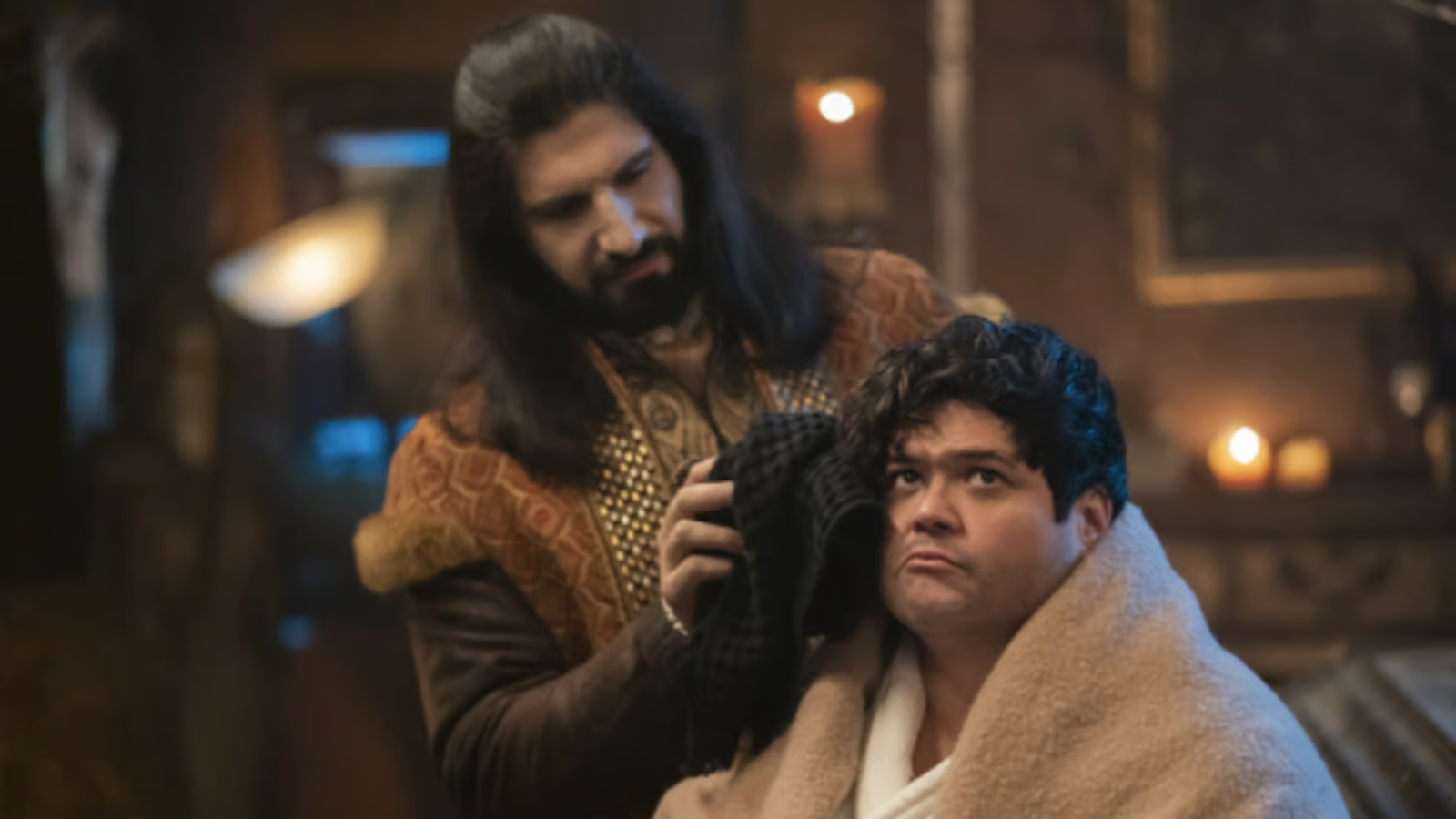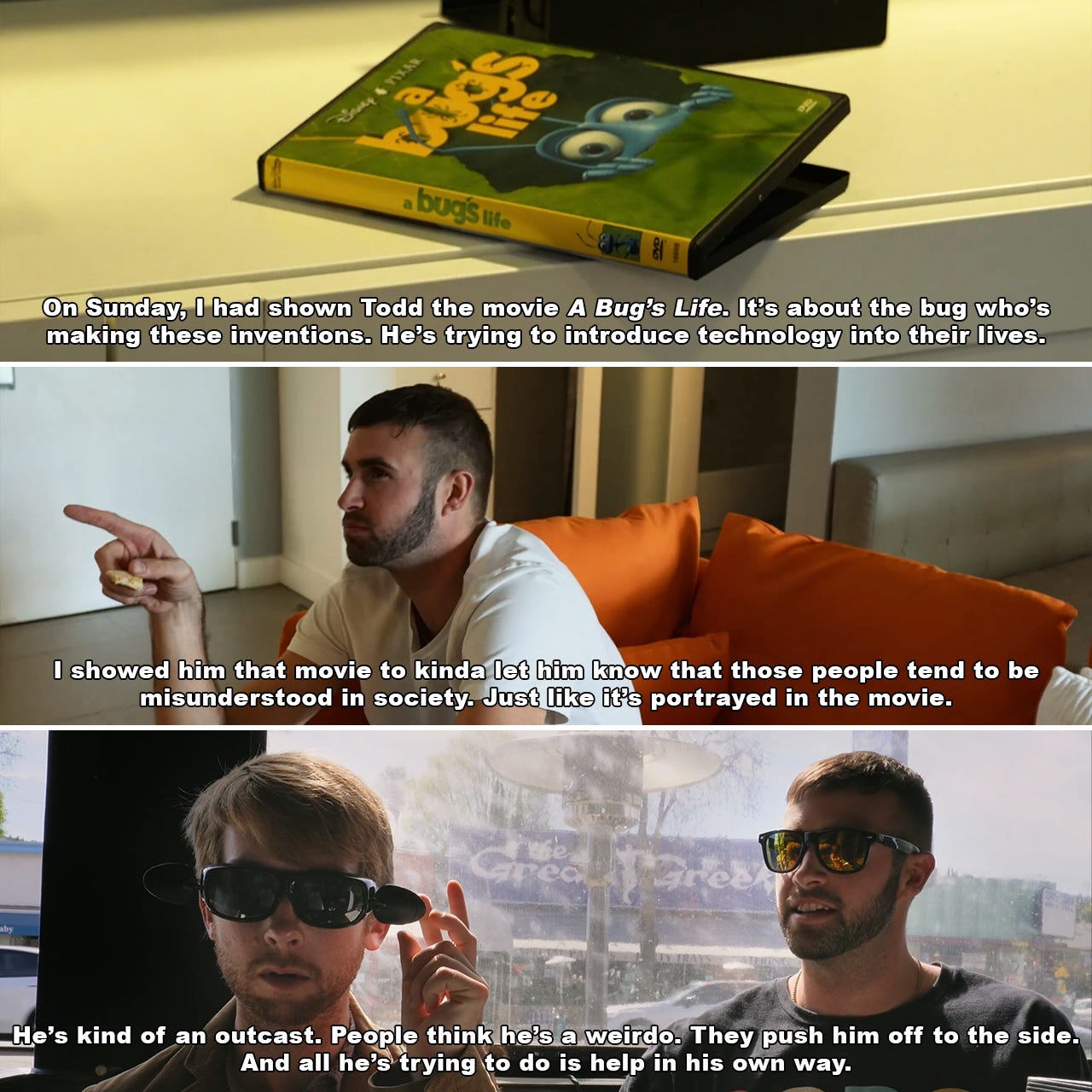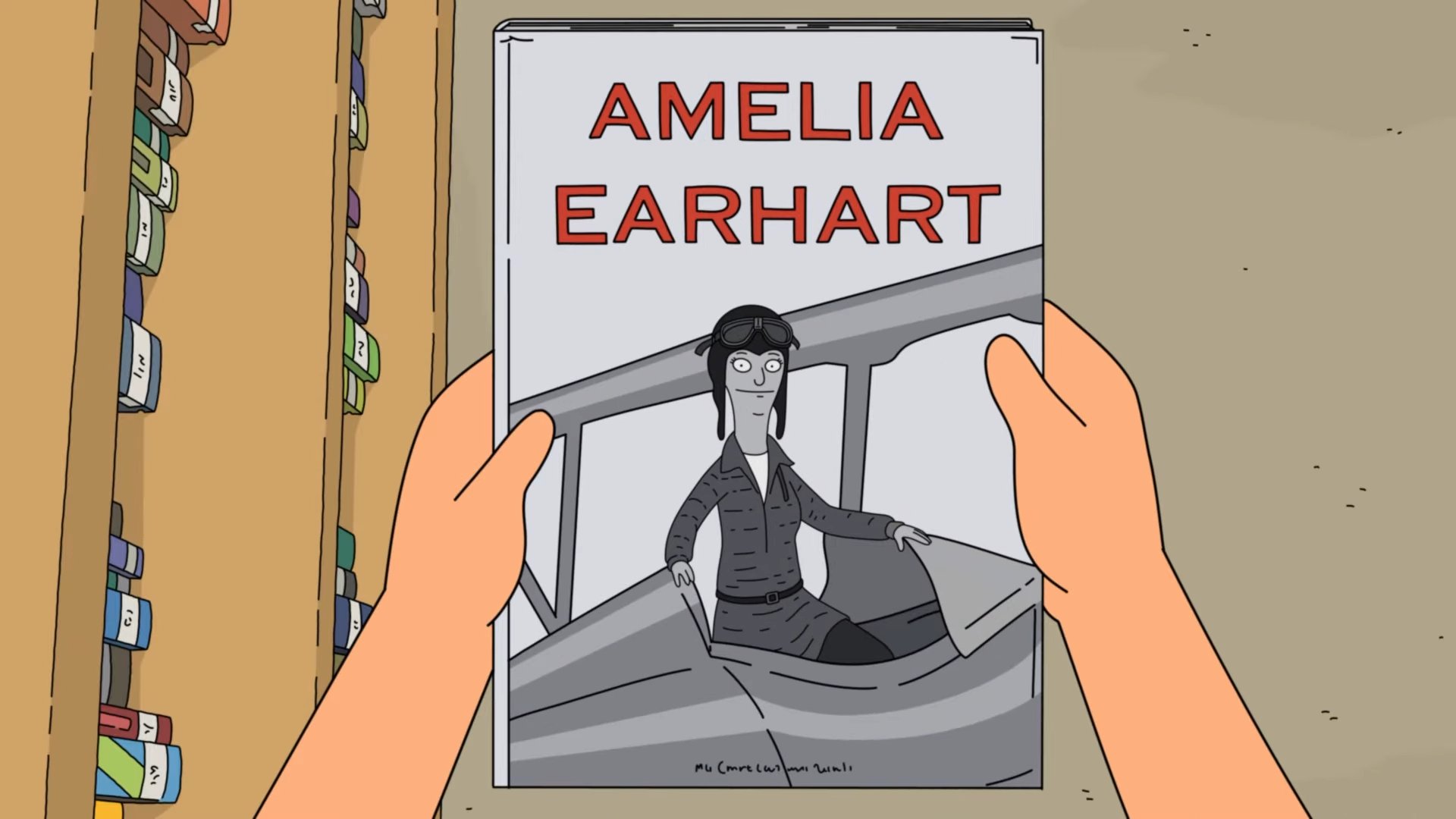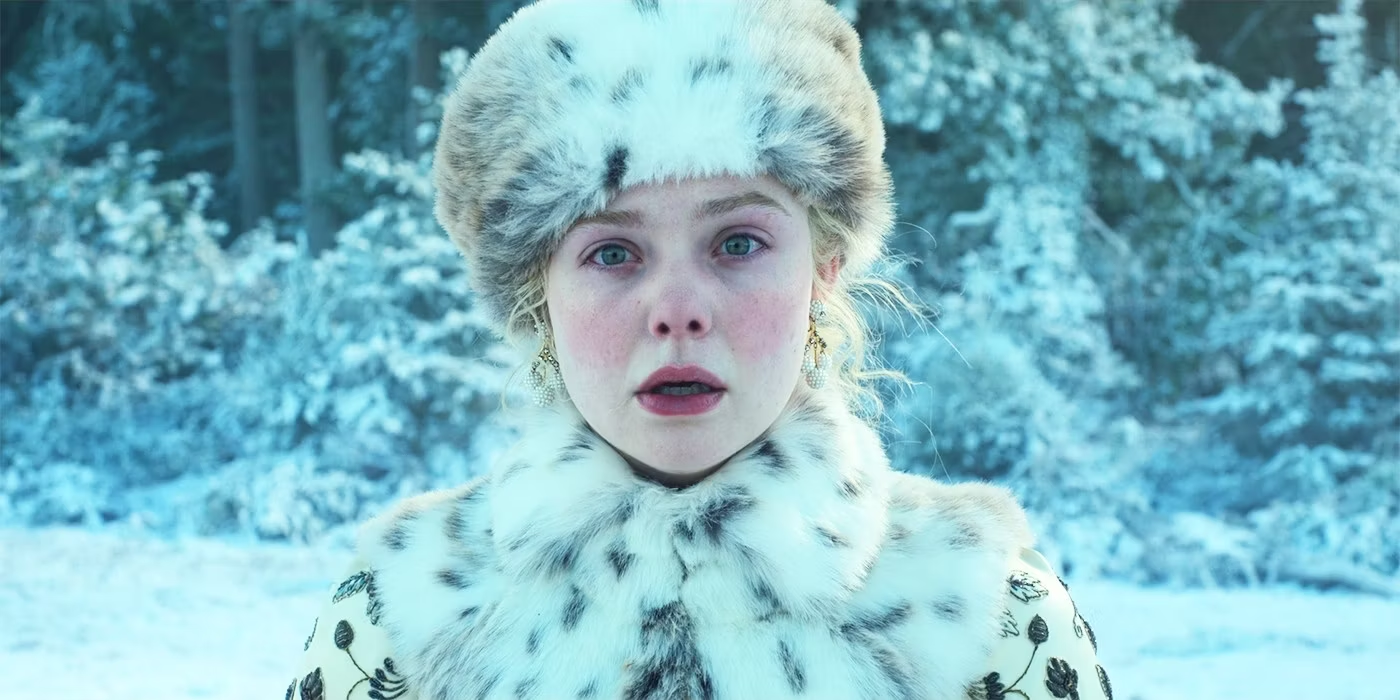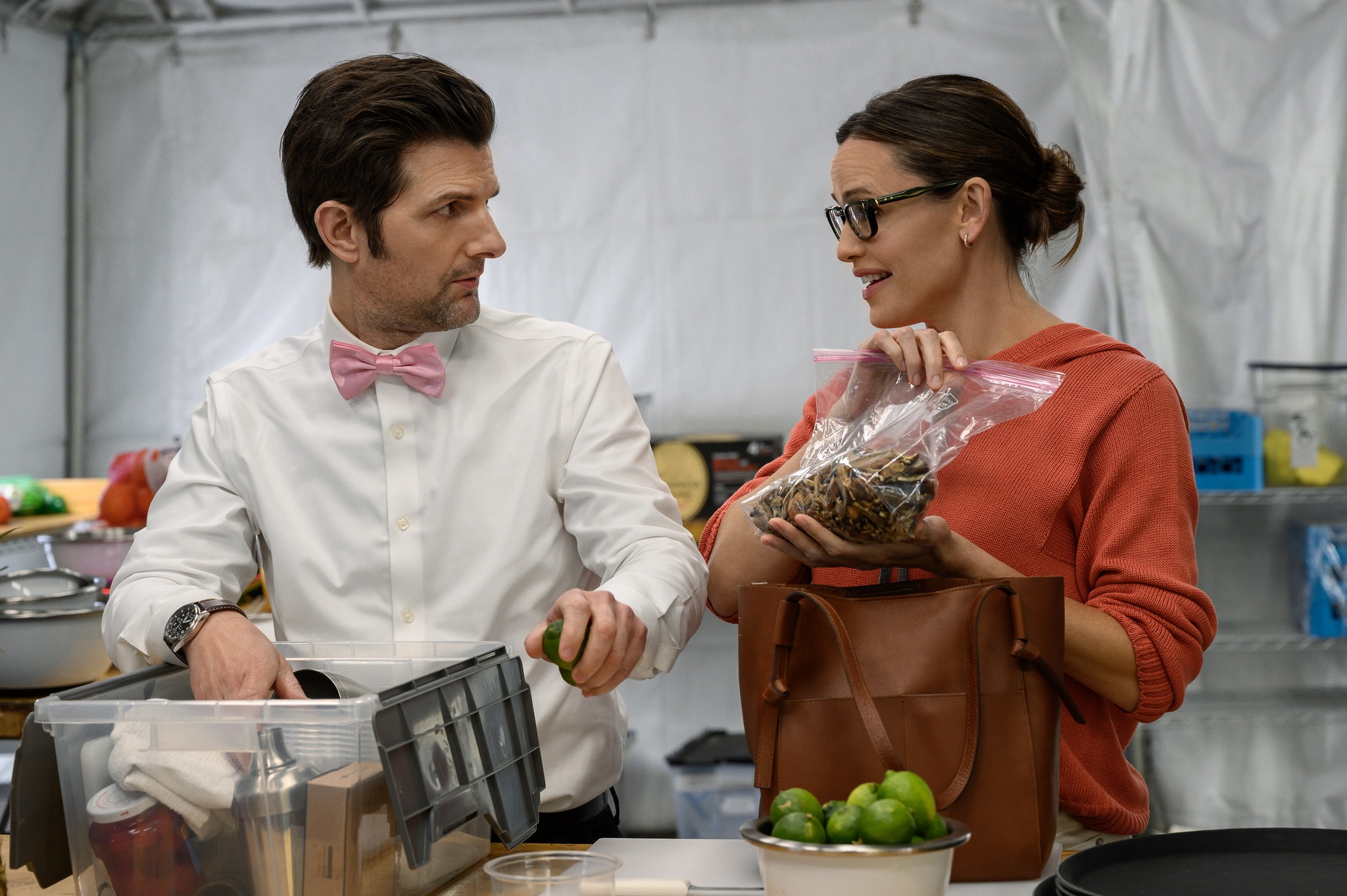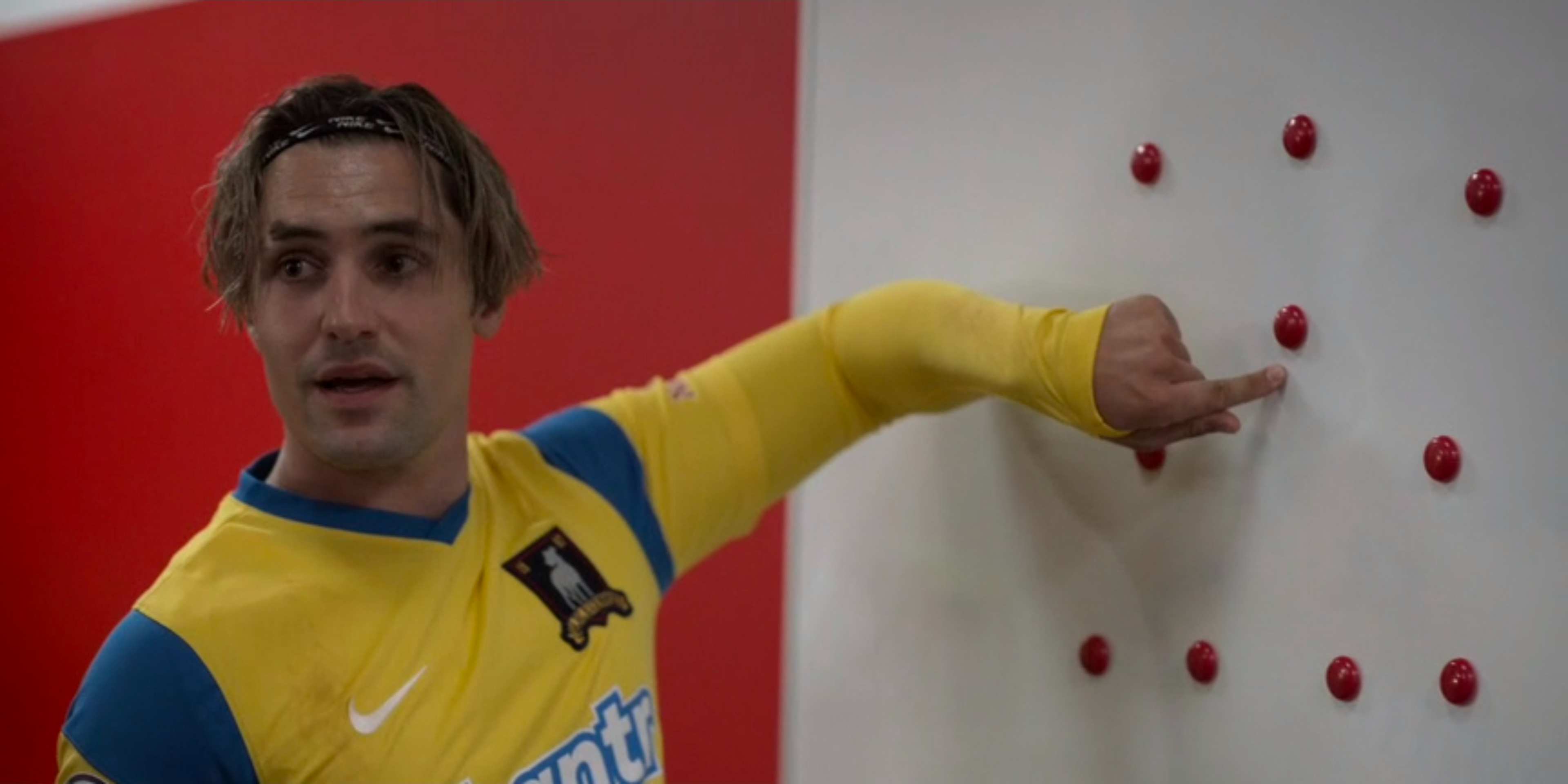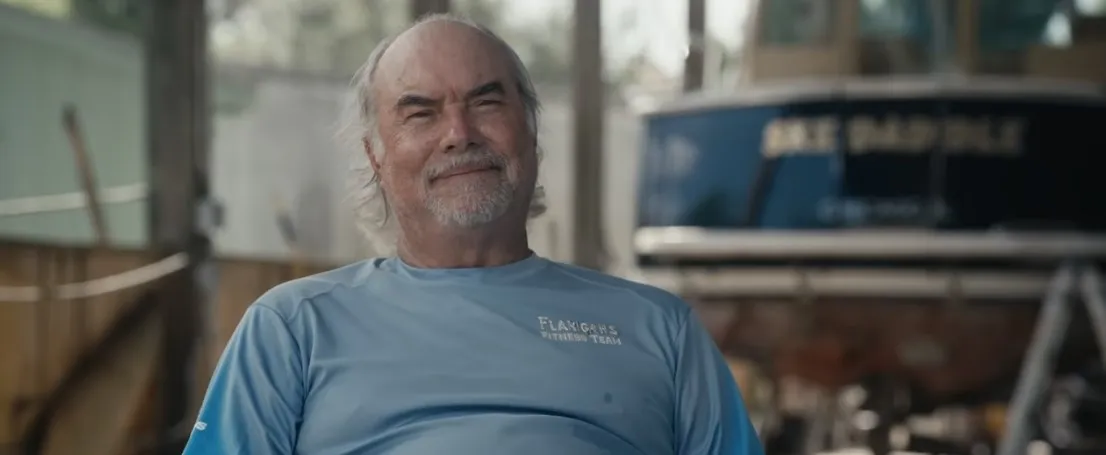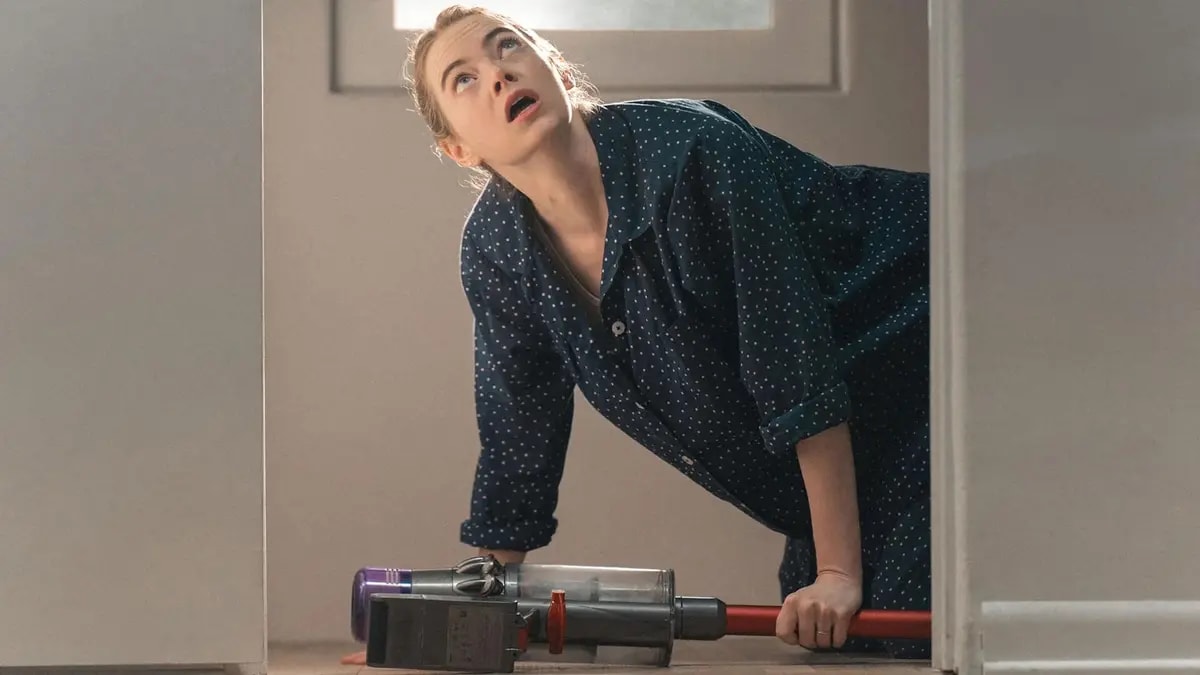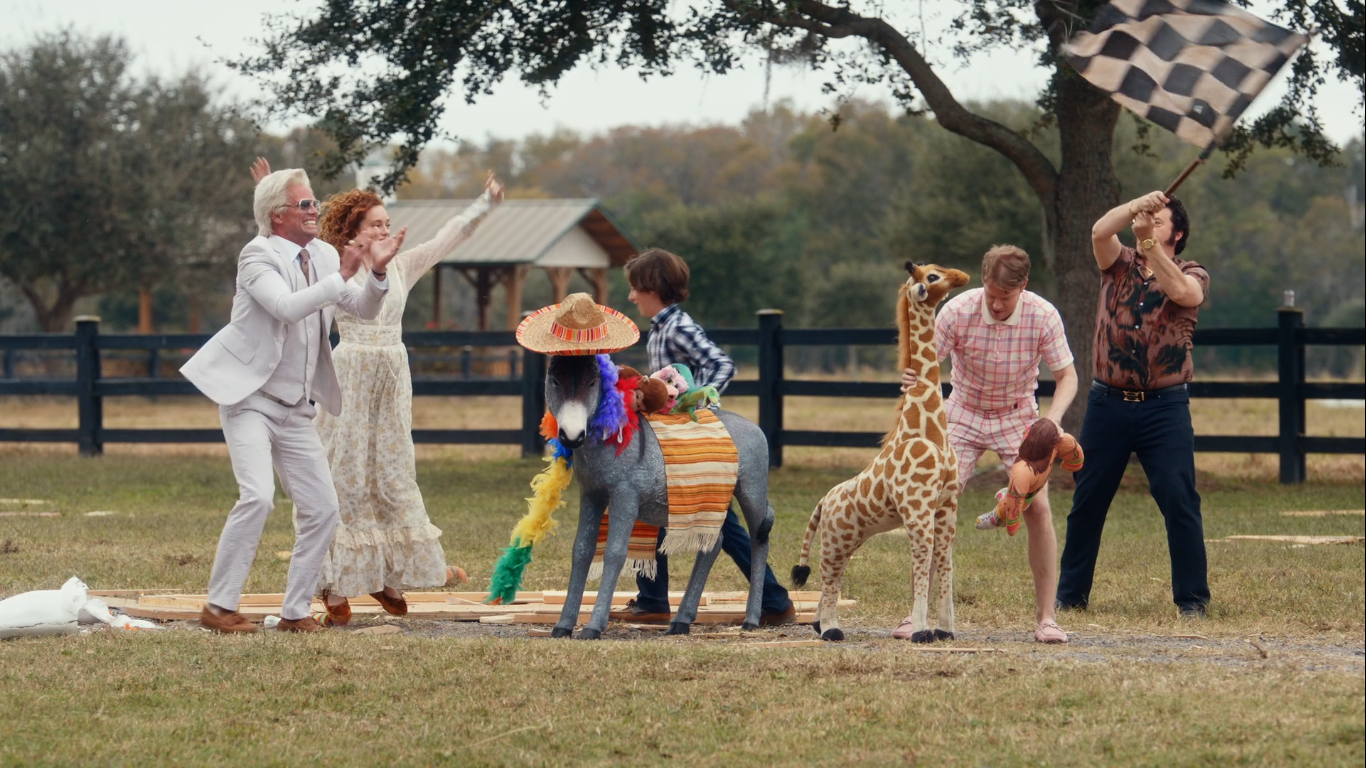Now that we’ve counted down the best TV shows of the year, let’s take a look at some of the most memorable moments we saw on TV.
Be warned that there are SPOILERS ahead.
What We Do in the Shadows – Nandor reveals why he never turned Guillermo
One running story throughout What We Do in the Shadows‘ first four seasons is that Guillermo, despite having Van Helsing blood and descending from a line of vampire hunters, wants to become a vampire– hence why he’s taken up the role of Nandor’s familiar, in hopes of being turned someday. But Nandor has demurred on doing so; with how self-absorbed all the vampires in the house are, it’s easy to see Nandor’s continually putting Guillermo off as just another expression of that.
But season five contains a bit of a twist: Guillermo had his friend Derek turn him into a vampire at the end of season four, but it didn’t quite take. Nandor, of course, would be furious about this (and vampire honor would demand he kill Guillermo and Derek if he learned the truth), so Guillermo works to keep his secret– although Laszlo discovers it and runs some experiments on why Guillermo isn’t fully turning and how to unlock his vampire powers.
Eventually, Nandor does find out and intends to kill Guillermo. Ultimately, everyone talks him down from his rage, and the vampires bring Guillermo on his first feed. And when it’s time to bite down and drain someone, Guillermo… just can’t do it. “I could smell their shampoo, and all I kept thinking was, this guy was at CVS just sniffing away at all these shampoos, and says, ‘Eh, I think I’ll get this one because it reminds me of where I used to go camping as a kid.'” Guillermo has killed vampires; he’s brought humans to the vampires; he’s disposed of bodies. But he’s never killed an actual human himself before, and he can’t bring himself to.
And that’s when we get a talking head with Nandor where he reveals he’s suspected this all along, and that’s why he never turned Guillermo. Nandor knows Guillermo better than Guillermo knows himself, and he knows Guillermo can’t handle what vampire life really entails.
For as much as Nandor seems to disregard Guillermo, he shows here he does care about him and knows him better than he lets on. After five seasons of Guillermo (and the audience) wondering why Nandor continues to refuse his request, it’s a deeply satisfying payoff that makes it all click into place.
Jury Duty – A Bug’s Life
Ronald Gladden ended up being the perfect find for Jury Duty in part because of his ability to take the craziness in stride, but perhaps even more so for his innate decency; he’s continually willing to help out his fellow jurors no matter how absurd their requests. These can range from covering for the huge log James Marsden left in his hotel toilet, or helping Noah, the rather naive and innocent young juror whose girlfriend is obviously cheating on him, hook up with another juror who’s had her eye on him (if you don’t know what “soaking” is, I’m not going to tell you).
But it’s another moment that isn’t prompted by another juror, but is totally spontaneous, that really shows who Ronald Gladden is. In the third episode, Todd, a socially awkward and somewhat strange juror who fancies himself an inventor, shows up to court in “chants”– “chair pants,” pants you can sit in (which, essentially, involves fashioning crutches that attach to the rear of the pants so he can sit without needing a chair). Naturally, this gets him a lot of shit from everyone else in the courtroom.
That night, Ronald invites Todd over to watch a movie, and picks A Bug’s Life. In Ronald’s view, the protagonist of the film is very similar to Todd himself: They’re both inventors who are just trying to bring new ideas to life to make people’s lives better and easier, and they’re misunderstood and often shunned and mocked for doing so. Ronald picked the movie because he wanted Todd to know he wasn’t alone in the world, and, if nobody else does, Ronald at least understands him.
It’s a genuinely sweet moment and perfectly captures why Ronald was such a great subject for the fake documentary: It’s not just that he manages to keep a level head amidst all the craziness thrown his way, it’s that he’s innately decent and kind in a way that seems far too rare in our world. This moment shows that he’s not just willing to help when a favor is asked of him, but that being genuinely considerate and helpful, thinking of others, and making other people feel better about themselves, seems to be his default mode. The crazy and hilarious antics of Jury Duty made the comedy a great hook, but Ronald Gladden gave it the heart it needed to be more than wacky, and gave us someone to root for amidst all the fakery and insanity.
Digman!; History of the World, Part II; Bob’s Burgers – the significance of Amelia Earhart
I don’t really have a particular moment for this one. I just thought it was funny that three different shows featured Amelia Earhart in some way last year.
The Great – Peter dies / Catherine pulls the trigger
The single biggest unexpected plot twist of the year (setting aside whatever the fuck happened in the finale of The Curse, which I feel is less a “plot twist” and a more “entirely upending what the show appeared to be”), was given to us by The Great, which suddenly and unexpectedly just killed off one of its two leads midway through the season.
While Catherine is the empress, Peter still seems intent on doing his own thing. With King Hugo and Queen Agnes of Sweden in exile in Russia, Hugo has managed to get into Peter’s ear (and into General Velementov’s, who suspects he’s dying and wants to leave a definitive legacy behind as a commander) that the time is right to retake Sweden. The three of them take an army and go, only for Catherine, and Peter’s best friend Grigor, to track them down. Catherine confronts him on a frozen lake and demands he return, but after some negotiation, Peter decides this is too important to him to abandon now, and he turns and heads away on his horse.
And then he falls through the ice. And dies. In episode six of a ten-episode season.
It was a ballsy and bold stroke– one of the two leads killed out of nowhere– and so shocking that for a time I still expected Peter would resurface alive somehow. But he never did. (The show didn’t completely get rid of Nicholas Hoult, though, as Peter’s doppelganger Pugachev still had a major role to play in the season.)
This throws to the finale. Catherine’s denial has turned into grief, and for the last few episodes, she seems to be frozen and unable to make any decisions– to the point where Peter’s aunt Elizabeth, who’s supported Catherine to this point, starts insinuating that she’s going to take the throne herself if Catherine doesn’t get her shit together. Catherine has taken to playing Russian roulette every morning– or a primitive version thereof, with six single-shot pistols, only one of them loaded– reasoning she will let fate decide whether she should remain empress. All this while Pugachev, impersonating Peter, has begun stoking rebellion in the towns and rallying the commoners to back him.
And then in the finale, Catherine picks the gun for the morning, puts it to her temple– and an assassin breaks into her chambers. Without thinking, she turns and immediately fires the gun at him– and it’s the loaded one. This seems to be the sign Catherine was looking for, and it snaps her out of her funk; she spends the rest of the finale as a torrent of ownage, reclaiming and consolidating her power and moving against her enemies. It’s in this finale that she truly becomes Empress of Russia in a way that has only been a title up until now. (And, sadly, it is the last we will see of her as such, as Hulu canceled The Great after three seasons.)
Party Down – Roman was right
The fourth episode of the new season of Party Down is titled “KSGY-95 Prizewinner’s Luau,” a pre-concert party for winners of a radio giveaway for Sting tickets.
It should be a pretty laid-back, fun event, outdoors and serving tropical drinks, so Henry’s new girlfriend Evie (Jennifer Garner) brings a big bag of mushrooms for everyone to enjoy. Roman is, naturally, reluctant to join in– as far as we know, his only drug experience was from accidentally eating the pot brownies at Constance’s wedding. But eventually, peer pressure causes him to cave.
And Roman, with no experience of mushrooms, goes about doing his job, but gets the paranoid feeling that there are a bunch of eyes on him, people are looking at him, something is off… and then two big guys escort him rather forcibly into the sponsors’ tent.
Nope, turns out that Roman isn’t paranoid at all– the “Prizewinners Luau” is actually a sting to catch deadbeat dads. (Yes, a “Sting concert” was one cop’s idea for a clever pun, and the other cops continually give him shit for it.) The cops, having assumed that Roman picked up that everything is not what it seems because he’s incredibly perceptive, rather than being hyper-aware and paranoid because he’s tripping balls, pull him in to help them identify the worst culprit to make sure the cops catch him. While he is, again, on mushrooms.
An already-great episode (aside, one of the most realistic depictions of mushrooms I’ve seen on TV) turns explosively funny with the reveal, entirely unexpected yet entirely making sense– and the perfect comic twist given Roman’s state of mind.
Ted Lasso – The scene where the team decides whether to forgive Nate and welcome him back into the fold after his bullying and leaving in the fashion he did
Just kidding! That scene NEVER HAPPENED! We just SKIPPED IT! Which is exactly the problem with what the show became. However, not to be entirely snarky, there was one worthy entry from the show…
Ted Lasso – “Stop going to me. Start going through me.”
The show was at its best when it used football to show how the characters had changed through Ted’s influence, and fittingly, the best moment of the season came from Ted’s hardest nut to crack in season 1, Jamie Tartt. Midway through season 3, in the episode “The Strings That Bind Us,” Ted (after independently conceiving of it the previous episode) tells the team they’re implementing Total Football– a positionless style of play where every player is expected to be capable of whatever they need to do and the focus is on getting in the right place for the action, filling the space other players have left empty as they do the same– and decides to switch the team’s tactical philosophy midseason. “Now, in Total Football, you gotta constantly be asking yourself, ‘What does this situation need right now?'”
To that end, Ted runs a practice where everyone tries playing a position completely unlike where they usually play– Isaac McAdoo, the fullback, switches positions with second striker Dani Rojas; etc. The one person the coaches don’t move is Jamie, as they decide to keep their golden-footed striker up front to do what he does best, score goals. Unlike the Jamie of season 1, season 3 Jamie is a bit disappointed by this.
When AFC Richmond tries Total Football in their next match against Arsenal, the first half is a disaster: Players aren’t moving in sync, they’re confused about where to go, and Jamie isn’t much good up front if nobody can figure out how to get him the ball. Down 3-0 at halftime, the locker room is full of grumbling and finger-pointing, and then Jamie speaks up.
Of course, he does this in hilariously insulting Jamie fashion: “I’m not doing it wrong. You’re doing it wrong.”
The locker room doesn’t take this well, but then he clarifies. “I mean… I mean… No, I mean, I think we’re all doing it wrong. If we want this to work, you gotta stop going to me and start going through me. You get me?” And he gets up to the whiteboard and moves the pieces around. Jamie’s idea is to move Dani forward to striker and drop himself back to center midfield, where he can orchestrate the offense like a quarterback or point guard. (Which would also, of course, sacrifice his personal stats for the good of the team.)
And “orchestrate” is the right word, based on the announcing at the game: Richmond scores a goal with Jamie running the offense and facilitating some fantastic ball movement until someone gets open on a breakaway and Jamie back-heels him the ball for an easy goal. “That was bloody gorgeous! A majestic, sweeping symphony of a goal, with Tartt in the role of conductor!” In the fashion of Ted Lasso at its best, Ted and Richmond lose the battle but win the war: That’s Richmond’s only goal and they still lose 3-1, but the elegance and effectiveness of the offense in the second half has convinced the team (and Trent Crimm) that Total Football will really work.
It also plays nicely into the closing scene, where Sam takes his visiting father to his restaurant, vandalized by anti-immigrant thugs, to find the rest of the team there cleaning and repairing it. Sam: “What are you guys doing here?” Jamie: “Well, we just asked ourselves, ‘What does this situation need?’ And we thought your situation needed us.”
Unfortunately, Ted Lasso season 3 failed to deliver moments like this nearly as consistently as it did in season 1. But moments like this, the best moment in the season’s best episode, reminded us why we loved the show in the first place.
Paul T. Goldman: We meet Royce Rocco
A show with as many insane moments as Paul T. Goldman would naturally both find its way onto this list and be very difficult to choose for. For me, especially given the buildup– for all we’ve heard about him from Paul, this doesn’t happen until director Jason Woliner interviews him twenty minutes into the hour-long finale– it’s meeting the man Paul has aliased as “Royce Rocco” in his crime fiction about his experiences: a guy he’s sure is the pimp for “Audrey Munson,” his second wife, and probably involved in child sex trafficking and god knows what else (I don’t even want to speculate on Paul’s runaway imagination).
The real man’s name is John Cadillac McDaniel, and while I wouldn’t call him a great guy, he’s certainly no criminal kingpin. About the only thing Paul is right about with him is that Cadillac was still sleeping with Audrey after she and Paul were married. Cadillac seems like a pretty standard, if colorful, fifty-something Floridian, a self-described “boat guy” and a playboy, a fun-loving type. And he seems to know himself and be comfortable with himself, which allows him to pretty blunt about the whole affair– he never met Paul, but he did date Audrey for years, including while she was married: “Whoever she was married to didn’t make a difference to me. … She always wanted marriage, it was very important to her. I’d tell girls right up front, that marriage isn’t in the cards for me. She needed somebody to cling on. So I told her she should go get married and keep me as a boyfriend or something.”
He’s pretty up front about Paul, too: “I have no sympathy for Paul, because I think he got, probably, what he deserved. If you’re gonna marry somebody that you know for how many months?1 How long were they going out? He’d obviously made a mistake in his prior marriage. He’s probably gonna have the same track record as her as far as multiple marriages and unhappy life.”
1 – Three.
We may not get the entire truth from Cadillac– there’s at least one odd moment we’ve seen in the series that he denies or can’t explain– but he’s pretty up front about his relationships with Audrey and Paul, and that Paul’s work is “97% fiction.”
The interview with Cadillac is the domino that starts the tumbling through the rest of the finale, as we finally get to some real answers about what about Paul’s speculation is true and what isn’t, and Woliner forces him to confront some of the damage he’s done by letting his fantasies spin out this wildly and acting on them– a finale that extends all the way to the show’s world premiere, where Woliner asks Paul about his thoughts about what he just saw. And as satisfying as those scenes are, it’s the person who’s perhaps most central to the mystery of the show, as he is to the story Goldman has designed to explain his life– perhaps even more so than Audrey– that makes the meeting with Cadillac a moment with tremendous buildup, the key to unlocking the real story behind the tale Paul’s spun.
The Curse: Uh, pick your moment from the second half of the finale
The Curse did give us a lot of good candidates for this list. (Asher’s speech to Whitney in the penultimate episode is one of the first ones that came to mind.) But the finale goes in such a bugfuck direction that it’s certainly going to be that half-episode that truly stands out as a moment.
You could reasonably pick the entire thing, although I don’t think a half-hour of TV can really qualify as a moment. So to be more specific: For me, it might be the moment when Asher makes it out of the house and that doesn’t fix the problem. It’s not the house; it’s Asher. Either that or the moment the chainsaw cuts through the tree branch. (Benny Safdie also gets a great scene as Dougie once he processes that what seems to have happened has really happened.)
I know this list has spoilers, but I really don’t want to get further into the details on what happened here if you missed the show. If I tried to tell you, you wouldn’t believe me.
NBA: The Denver Nuggets win their first championship
Is this a bit of homer bias? Yes. Is it also recognition that Nikola Jokic is the best basketball player in the world and an absolute delight to watch? Also yes.
The Righteous Gemstones: Monster truck fun!
My #1 show of the year has to come in here, of course. And while this excellent season provided us with a lot of great moments– like B.J.’s fight with Stephen, the test run of Baby Billy’s Bible Bonkers, or any time Walton Goggins said “Baby Billy’s Bible Bonkers”– it’s that final scene of the family taking turns driving the Redeemer and smashing shit up that I close this article with. And it’s the fact that the extended family– all the Montgomerys– are there, including Eli’s brother-in-law Peter, that really got to me. But it needs some setup to explain.
Back in 2000, Peter Montgomery, married to Eli’s sister May-May, went broke stocking up on Eli and Aimee-Leigh Gemstone’s Y2K doomsday prepper kits, and the family is in danger of losing their house. Eli offers to buy the prepper kits back, but May-May is too prideful to let their family take charity from her wealthy brother. So Peter decides to rob a bank instead. And gets shot in the leg for his troubles and spends two decades in prison.
When he comes out, he’s got revenge on his mind and a militia to seek it with– with his and May-May’s two sons, Chuck and Karl, in tow– preaching to them about how the Gemstones are the emblem of wealth corrupting belief, false prophets who sell the Word instead of live by it. And he concocts a series of plots to get it, culminating in kidnapping Jesse, Judy, and Kelvin, and ransoming them to Eli, threatening to kill them if he doesn’t get the money. This doesn’t work– Eli refuses to pay because he doesn’t believe Peter is capable of killing his children (which is true, but unfortunately for Eli, less so of the other militia members). Ultimately they’re rescued: Karl, who’s always been on the fence about the extreme actions Peter and the militia are willing to take, calls his mama, and May-May breaks the Gemstone siblings out of captivity. Peter and Chuck find them, and Peter orders Chuck to shoot May-May. Of course he can’t do it, but it’s also then that Gideon makes his rescue. Gideon, the former Hollywood stuntman, followed May-May to the militia compound, where he steals the Redeemer back and uses it to raise hell, trash everything in sight, and crush the blockade the militia has set up so they can all escape.
Then Peter’s militia turns on him over his Gemstone obsession– they’d rather go protest Confederate statues being torn down and find ways to make money– so Peter and Chuck go by themselves to bomb the Gemstone church. And while Peter is doing some shopping, the truck blows up in the parking lot– and Peter thinks he’s killed his own son. Now he has nothing to lose.
Even though he lost that truck, Peter still knows how to rig a bomb, and after stealing Kelvin’s truck from a gas station, he arrives to the Gemstone church with another one, with a timer connected to a FitBit on his wrist just in case the Gemstones try anything funny. Then he discovers that Chuck is alive (and intentionally detonated the bomb before it could really hurt anyone), and reconsiders what he’s doing, and that “God always seems to have the Gemstones’ backs.” And then he slaps one stray locust (yep, locust swarm, biblically enough) off his wrist, and the FitBit falls off. Realizing what he has to do, he drives the truck off into the woods far from any people to detonate it safely, seemingly sacrificing himself for the family.
Anyway, that’s a lot to set up what’s the final scene of the season: The entire Gemstone family, partners included (maybe the funniest moment is when everyone looks at the custom chairs Keefe, a skilled woodworker, has made for himself and Kelvin, and finally realizes what his name actually is), gather on the lawn at their estate to take turns driving the Redeemer to smash up random shit for fun. That includes Baby Billy and Tiffany. And the Montgomerys. All four of them.
The monster truck action rules and is a blast to watch, but that’s not what made this scene so powerful to me; it’s the inclusion of all the Montgomerys, Peter especially. Despite the years of fighting and bitterness, despite the betrayals, the Gemstones welcome the Montgomerys back. Despite the kidnappings and attempted murders, the Gemstones welcome Peter back. Granted, it’s Peter missing half his right leg (I guess he only got so far away from the bomb before it exploded), but he’s there; he’s family.
It’s a scene that really explains why God always seems to have the Gemstones’ backs: For all their selfishness and avarice, for the siblings’ pettiness and immaturity, when the stakes are truly meaningful, they find ways to live up to the ideals they spread, to extend grace and forgiveness to others. (It’s a mirror to season 1’s finale, which ends with Jesse admitting his need for and seeking the same.) Would that we all had families that could do that.
The Righteous Gemstones: Kelvin is, at last, true to himself
I’m not gonna leave you on a downer of a sentence like that, and this moment absolutely deserves to be mentioned. What more can I say that this clip doesn’t already say?
Thanks to everyone who read through this all week. If you would like to provide more tangible support for my work, you can donate here or here.

